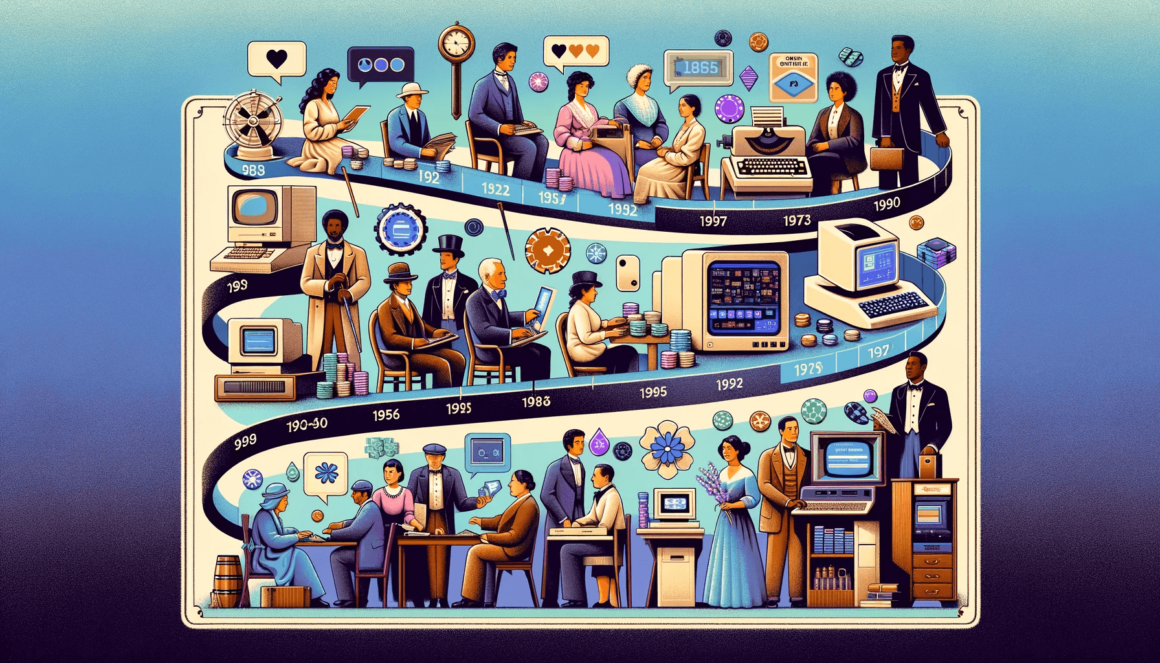Exploring the Roots: The Gripping History of Online Gambling
The history of online gambling all roots back to the desire for convenient and accessible ways to indulge in games of chance.
It was in 1994 that the Free Trade and Processing Act was enacted, signaling online casinos’ emergence, establishing the legal basis for Internet gambling, and paving the stage for its fast growth.
Get ready to be immersed in a riveting narrative about the history of online gambling and how its dynamic evolution has changed how people interact with games of chance.
🏆 Top Online Gambling Sites
Considering a range of factors, here are the best online gambling platforms, suitable for both beginners and pros:
- Ducky Luck(💰 500% Welcome Bonus up to $2,500)
- SlotsandCasino (💸 300% Match Bonus of up to $1,500)
- Wild Casino (🎁 $5,000 Welcome Bonus)
Highlights of the Article
- It was in 1994 that Microgaming was founded, and the entire industry started rolling.
- By the end of 1998, approximately 700 online casinos were in operation.
- Planet Poker emerged as the pioneering online poker site in 1998.
- World Poker Tour debuted on the Travel Channel in the United States.
- The UIGEA was passed in October 2006 by attaching it as a rider to the “must pass” Safe Port Act.
- CryptoLogic became a public company and is listed on NASDAQ under CRYP.
- In 2010, online gambling increased by 12.5%, and players spent 10% more time playing.
- Online gambling accounts for approximately half of all transactions with Bitcoin.
Timeline Of Online Gambling

Before the rise of online casinos, traditional gambling games such as poker, blackjack, roulette, and slot machines were popular among gamblers worldwide.
Online casinos made casino games accessible from home or on the go, breaking down geographical barriers and transforming the gambling experience for players globally.
Now that the groundwork has been laid, explore the intriguing events that led to the remarkable evolution of this industry.
The Internet’s Emergence
Today’s Internet didn’t always exist. Before online casinos, dealers carried slot machines in racks between casinos. This made it difficult for players to find slots at any given time.
This limitation changed with the advent of the internet. Casino games such as virtual slot machines, blackjack, poker, roulette, and more could now be played online.
The Precursor To Online Gambling
In 1993, bookmakers introduced Teletext pages displaying live sports odds and offered phone betting services. Teletext and telephone betting served as precursors to the convenience and accessibility of online betting.
It wasn’t just bookmakers capitalizing on new technology; online casinos were also at the forefront of this movement.
Around 1994, new companies like Microgaming and InterCasino were dedicated to online casino platforms.
Free Trade and Processing Act
Enacted in Antigua and Barbuda in 1994, the FTPA catalyzed the growth of the online gambling industry.
Background and Origins
The twin states had local casino facilities even before independence in 1981. Their brick-and-mortar casino industry is flourishing, has a vital economic position, and is a popular attraction for international tourists.
Events Leading to the FTPA
In 1994, the government of Antigua and Barbuda saw an opportunity to cash in on the emerging popularity of the Internet and identified an opportunity to position itself as a hub for online gambling.
The government negotiated and discussed with international trade bodies, particularly the World Trade Organization (WTO), to establish its legitimacy as an online gambling jurisdiction.
Passage and Provisions of the FTPA
The Act created a legal jurisdiction and allowed licenses to be granted to operate online casinos, albeit without any meaningful regulation and enforcement.
Impact and Results
Numerous online casinos and gambling companies set up operations in Antigua and Barbuda, contributing to the economic growth of the country and creating employment opportunities.
The Birth of the Online Gambling Industry
Debate arises regarding who was the first to offer online casino games, but Microgaming’s the Gaming Club and Cryptologic can undoubtedly claim to be among the first.
Microgaming was formed in 1994, marking the start of the industry’s rise. Under their logo, they introduced popular land-based casino games like Blackjack, Craps, Video Poker, and Roulette.
Cryptologic’s InterCasino offered online casino games with an integrated payment mechanism by 1996. This payment method allowed online gambling to thrive.
Kahnawake Gaming Commission
The 1996-founded Kahnawake Gaming Commission licenses online gambling operators worldwide and is recognized and accepted in various jurisdictions.
Licensees must report, audit, prevent money laundering, and secure data. These ensure that regulated online gaming providers are honest, transparent, and accountable.
Additionally, the KGC provides a fair dispute-resolution mechanism for players and operators, promoting trust and confidence.
The Growth of Online Gambling Sites
Internet gambling experienced explosive growth, increasing from an estimated 15 sites at the end of 1996 to more than 200 by the end of 1997.
With the growth of online gaming, more software companies emerged. Playtech plc joined in 1999, renowned for its high-quality games focused on intricate details to provide a realistic online gaming experience.
By 1998, 700 internet casinos processed real-money wagers in multiple currencies, generating $835 million to $1 billion in annual revenues.
The Introduction of Online Sports Betting
Online betting started when Hereford United and Tottenham Hotspur played an FA Cup rematch in 1996, and a Finnish customer bet $50 on Intertops, now called Everygame.
Eurobet in the UK and Centrebet in the Northern Territory of Australia launched online sports and race betting in 1996. By 1997, three more sportsbooks were opened.
Online Poker’s Arrival
The introduction of online poker transformed the internet gambling business, transforming how people engage with and participate in gambling activities.
1998: Online Poker’s Landmark Year
Planet Poker, the pioneering online poker site, emerged in 1998. Paradise Poker followed in the next year with a more advanced platform, leading to rapid growth.
2000: Challenges And Emerging Competitors
Dutch Boyd’s PokerSpot introduced online tournaments in 2000 but faced payment challenges and ceased operations by 2001.
PartyPoker and PokerStars challenged Paradise Poker’s dominance in 2001. PartyPoker’s tournament qualifications to live events and PokerStars’ World Championship of Online Poker gained popularity
2003: The Poker Boom
The World Poker Tour premiered on the Travel Channel in 2002, and ESPN aired the World Series of Poker in late 2001.
Online poker soared after Chris Moneymaker’s famous $2.5 million victory at the World Series of Poker in 2003, sparking a poker boom in the United States.
Internet Gambling Prohibition Act
The enactment of the Federal Interstate Wire Act in 1961 rendered placing bets across telecommunications lines illegal.
However, it upheld a previous court decision stating that the Wire Act does not explicitly prohibit internet gambling involving games of chance.
1997: First Formal Attempt To Ban Online Gambling
In 1997, Sen. Jon Kyl, a vocal critic of online gambling, introduced the Internet Gambling Prohibition Act. It did not pass, however, and online wagering continued to thrive.
As opposition to internet gambling intensified, Kyl amended the Prohibition Act, but Congress rejected it again. Then the House of Representatives rejected Bob Goodlatte’s third bill amendment.
2005: HR 441 is Introduced
In November 2005, Rep. James Leach introduced HR 441, or the Internet Gambling Prohibition and Enforcement Act, which sought to modernize the Federal Wire Act of 1961 by expanding the definitions.
It included language that would expand the definition of wire communications to have internet, mobile networks, and telephone wires.
July 2006: Enactment of HR 4411
The House of Representatives passed HR 4411 in July 2006, but the Senate did not read or act upon it.
September 2006: A Stealthy Move In Congress
Congress aimed to pass the SAFE Port Act, prioritizing maritime ports, security, checks, and anti-terrorism, in September 2006.
Senators Bill Frist and Jon Kyl filed a Conference Report on the act on September 29. They added some parts of HR 4411 to the report but removed any connections to the Federal Wire Act.
The UIGEA was now a part of the SAFE Port Act, but only a few Senators knew about it. September 30 was the final session of Congress, so they were eager to get things done quickly.
October 2006: Passing of SAFE Port Act
Both the House and Senate waived the final reading of the Conference Report and moved to pass the SAFE Port Act. Only two representatives voted against it.
From there, the act was sent to President George Bush, who signed it into law on October 13, 2006. Most of the legislators who approved it had no idea they had just voted to pass the UIGEA.
Unlawful Internet Gambling Enforcement Act (UIGEA)
Despite the shady process, the UIGEA became law.
It attacks the payment processes used to deposit, bet, and withdraw funds on thousands of offshore online gambling sites.
Democrat Barney Frank referred to UIGEA as “one of the stupidest pieces of US legislation ever passed.”
The online gambling industry significantly suffers as Americans are legally barred from participating. Any operator who accepts players from the United States will face the Department of Justice.
Multiplayer Online Gambling
In 1999, Boss Media released its multi-player game platform development, marking a significant milestone.
This key innovation allowed two or more players to play the same game at virtual gambling tables without having to play against the house.
Interactive Gambling Moratorium Act
Due to differences between territories, the Australian government implemented the Interactive Gambling Moratorium Act in late 2000, outlawing internet casinos and sportsbooks founded after May 2000.
Lasseters remained the only online casino operating from Australia, as it was already operating under a valid license in 1999; it can still operate offshore but cannot take bets from Australians.
Banned services include:
- Online casinos
- In-play sports betting
- Sports betting services without an Australian license
- Betting on the outcome of a lottery
The Rise of Online Gambling in the 2000s
From 2001 onward, online gambling was marked by legislation and lawsuits. The United States sought to ban it, while the United Kingdom embraced legalization for increased profitability.
CryptoLogic became the first online gambling firm to debut on NASDAQ as CRYP. Investors could trade stocks after the listing, strengthening the industry.
Online gambling thrives despite legal issues. As of 2006, over 2,300 online casinos generated $12 billion in revenue.
The Introduction of Online Live Betting and Mobile Betting
In 2002, live betting was introduced for the first time, allowing gamblers to put wagers on a sporting event as it was happening.
Most betting sites now offer live betting on a wide variety of sports. Most major sites allow mobile betting on phones, tablets, and other devices.
Online Gambling Industry in 2008
The global internet gambling revenue was $23.5 billion in 2008, according to H2 Gambling Capital, with a $4.8 billion increase from the previous year. In the last quarter of 2008, there were over 2,300 internet gambling sites.
H2 Gambling Capital estimated that offshore companies generated $5.9 billion in online gambling revenue from US players and $21 billion from players worldwide, following the UIGEA.
In 2008, Italy legalized online poker and sports betting, leading to approximately €150 million in tax revenues by 2009.
The 2010s
Online gambling grew 12.5% in 2010, and gamers spent 10% more time playing. And 2,679 internet gambling websites were owned by 665 different companies that year.
The following is the breakdown of sites by sector:
- 865 online casinos
- 616 poker rooms
- 516 sports- or race-betting sites
- 426 bingo sites
- 187 other/lottery sites
The surge in online gambling can be attributed to the widespread use of mobile devices. During the same year, smartphone sales reached new heights, surpassing 1.6 billion units, according to Gartner Inc.
The Pandemic
The lockdown during the pandemic resulted in a surge in revenue for the online gambling industry.
During the COVID-19 lockdown, online poker in the United States saw a 43% increase in usage and a 255% rise in first-time players enjoying poker live, online, or with friends.
The State of Online Gambling in the 2020s
The worldwide online gambling market, valued at$44.317 billion in 2019, is forecasted to grow at a CAGR of 7.13% and reach$66.994 billion by 2025.
One of the most significant changes in the industry in recent years has been the introduction of cryptocurrency. Crypto gambling platforms offer players greater flexibility, convenience, and faster payouts.
Online gambling accounts for approximately half of all transactions with Bitcoin.
Examples of popular cryptocurrency casinos include:
- Stake: The High-Stakes Casino
- True Flip
- Bet King
- Bustabit
- Bustadice: Next Generation Dice
- Primedice
- Funfair
- Wagerr
Cryptocurrency casinos now offer innovative and safe Provably fair games, ensuring increased transparency and security. Decentralized gaming platforms also allow players to bet against each other using blockchain technology.
Closing Remarks
Online gambling’s timeline is a story of innovation, regulatory advancements, and technological breakthroughs that have shaped the industry into what it is today.
As long as there is a demand for convenient and accessible ways to enjoy games, the online gambling industry will likely continue to grow and evolve.
FAQ
What are the historical origins of gambling?
The earliest concrete evidence comes from Ancient China in 2300 B.C., where tiles were unearthed, which appeared to have been used for a rudimentary game of chance.
What is the importance of online gambling?
The industry’s growth has created employment opportunities for many individuals, and legalized gambling websites help boost the economy.
What are the effects of online gambling?
Online gambling, while enjoyable and social, can cause many issues, such as gamblers drowning in debt. The bottom line is to play responsibly and know when to stop.
How does gambling impact people and society?
Online gambling can benefit and harm society. Problem gambling can lower work performance and lead to job loss, despite the industry’s growth.
 BC.Game
BC.Game  7Bit
7Bit  Ducky Luck
Ducky Luck  Red Dog
Red Dog